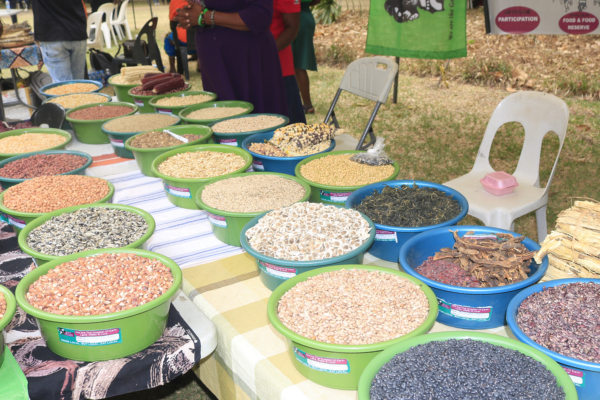In honour of International Day of Rural Women and World Food Day this month, VSO proudly co-organised the 7th Zambian Traditional Seed and Food Festival.
This annual event, which celebrates Zambia's cultural heritage through seeds, food, and traditions, gathered farmers and civil society organisations together, to address some of the most pressing challenges facing the nation’s agricultural sector.
A platform for farmers and agroecology
The festival, organized by PELUM Zambia, Zambia Alliance for Agroecology and Biodiversity (ZAAB), VSO, and other partners, aimed to foster a healthier, more resilient food and seed system. Smallholder farmers from across the country joined in the event, sharing seeds and knowledge while raising awareness of policies that threaten agricultural biodiversity—a crucial resource sustaining rural communities for generations.
Against the backdrop of one of the worst El Niño-induced droughts in recent memory, which devastated crops across 80 districts, the theme of this year’s event was particularly timely: Building a Healthy, Resilient Food and Seed System. Farmers faced a dramatic collapse in maize production, affecting over one million hectares, which triggered food shortages and price hikes. The prolonged drought ultimately led to a state of national emergency.
A collapsing food system: Zambia at a crossroads
In July, the African Center for Biodiversity (ACB) declared Zambia's food system ‘collapsed,’ citing climate change, biodiversity loss, and increasing debt as the main factors.1 The situation is dire: maize prices have soared by 30%, with food shortages affecting nearly six million people, and an estimated 5.8 million expected to face heightened hunger from October 2024 through March 2025.
This crisis has exposed the vulnerability of Zambia’s rainfed agricultural sector, particularly for the over 70% of smallholder farmers who rely solely on rainfall. Maize, the country’s staple crop, has become a monocrop, with 65% of the country’s arable land dedicated to its production. Unfortunately, unpredictable weather patterns, soil degradation, and poor access to markets have caused maize yields to decline, leaving millions of farmers struggling.
Beyond maize: The promise of traditional grains

Zambia has a wide range of climate-resilient crops, such as millet, sorghum, and groundnuts, which could play a critical role in improving food security. These “small grains” are highly nutritious and better suited to withstand droughts, yet they remain underutilized due to limited market opportunities and restrictive seed laws. Current legislation, such as the proposed Plant Breeders Rights (PBR) Bill of 2024, threatens to further marginalize small-scale farmers by aligning with international treaties like UPOV 91, which limit farmers' ability to freely use, share, and sell their seeds.
This policy would stifle the rich diversity of Zambia's indigenous crops, criminalizing the traditional seed-sharing practices that have sustained communities for generations. Instead, these resilient crops should be embraced and supported as a sustainable solution to hunger and climate challenges.
The call for food sovereignty
At the festival, farmers voiced their concerns about the PBR Bill and highlighted the importance of seed and food sovereignty. Agroecology, a holistic approach that integrates ecological practices into farming, was the centerpiece of their vision for a sustainable food system. The festival's venue showcased a syntropic garden, maintained by ReSCOPE Zambia, demonstrating how farmers can cultivate a diverse ecosystem without relying on chemical fertilizers or extensive rainfall.
Farmers issued a collective statement during the festival reading:
“We the Zambian farmers gathered here yesterday and today are convinced that agroecology, farmer managed seed systems, and inclusive markets are the best framework for sustainable food systems. Agroecology supports crop and food diversity, which is the bedrock of food security, climate resilience, and economic sustainability.”
VSO’s role in Zambia’s agroecological future
As a co-organizer of the festival, VSO facilitated the participation of two smallholder women farmers from Petauke in Eastern Zambia, providing them with the opportunity to exchange knowledge with fellow farmers from across the country. Beyond the festival, VSO is actively involved in the development of Zambia’s first National Agroecology Strategy (NAS), working closely with the Ministries of Agriculture and Green Economy.

By promoting agroecology, VSO aims to help transform Zambia’s food system into one that is more resilient, diverse, and sustainable. This festival was just one step in the larger journey toward food sovereignty—empowering smallholder farmers to protect their traditions, their seeds, and their future.
The Zambian Traditional Seed and Food Festival not only highlights the rich agricultural heritage of Zambia but also underscores the urgent need for a sustainable and resilient food system. By championing agroecology and advocating for policies that protect smallholder farmers, VSO and its partners are helping pave the way toward food sovereignty in Zambia.
Together, we can build a food system that is healthier, more resilient, and better equipped to meet the challenges of the future.
Read more

The year 2024 in photos and the stories behind them
Here we share some of VSO’s iconic imagery over the past year that capture the resilience and determination of the communities and volunteers we support. It’s also an opportunity to pay tribute to some of the people behind the lens who have helped bring their stories to light.
'Here's to every volunteer' - an inspiring song from volunteer and artist Larry Dwayne
Known in the music industry as Larry Dwayne, Lawrence Ochieng is a Kenyan volunteer, hip-hop artist, and activist who uses his platform to raise awareness about climate change. Listen to his original song, 'Volunteer'.
Meet the 2024 Volunteer Impact Award winners
Our annual Volunteer Impact Awards celebrates the incredible impact made by VSO volunteers across the world. Learn more about our four 2024 winners.
